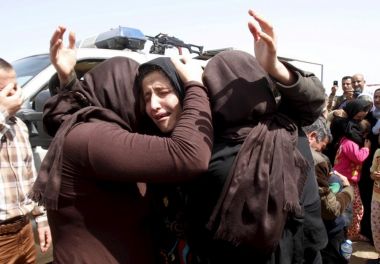Yazidi woman recalls harrowing escape from ISIS captivity in Raqqa, with help from jihadist's wife

In a rare show of humanity inside the stronghold of the Islamic State (ISIS) in Raqqa, the wife of an ISIS fighter saved a captive Yazidi woman by helping her escape from her captor, who was her husband.
"Aveen," 23, told NBC News that her captor's wife took pity on her and released her to a neighbour so she could escape the brutality handed by the bride's partner.
Her harrowing escape did not happen quickly as she had to be smuggled to at least six safe houses in ISIS territory before she ultimately gained freedom.
Aveen is among the more than 3,000 women and girls taken captive when ISIS attacked ancestral Yazidi villages around northwestern Iraq's Sinjar Mountain in August 2014. Nearly half a million people have been displaced since, according to the Kurdistan Regional Government's Yazidi Affairs Directorate.
Aveen said she spent most of her time with the ISIS in Raqqa, held by a fighter who raped and beat her repeatedly.
She gained her freedom after nearly a year in captivity.
She told the story of how members of the terror group enslaved and raped even young girls as young a seven, nine and 10.
According to her, women and children were held in a school where the guards would come at night to take away women and rape them.
Like Aveen, "Jeelen," whose name has been changed to protect her identity, also escaped her ISIS captors in August, along with her nine-year-old sister.
She said all her siblings and nieces were held by the ISIS militants. Her 11-year-old sister was traded for $25,000 to $35,000 because "she is very beautiful.''
More than 1,000 Yazidi women and girls have escaped from the clutches of ISIS, but thousands more are still being bought and sold in ISIS-controlled areas. The young become sex slaves and older women are beaten and used as house slaves, according to survivors and accounts from ISIS militants, NBC News reported.
Some are also sold for weapons, or for just $10, or 10 cigarettes. Others call their families to demand ransom, said activist Khider Domle who has interviewed dozens of women and girls who have fled ISIS.
According to aid workers and community elders, many of these women suffer from psychological trauma and have physical injuries.
Currently, the regional government offers basic medical check-ups and psychological support for the escapees. The Jiyan Foundation for Human Rights which runs a small clinic in the Kurdish city of Duhok also provides medical care and psychological treatment for Yazidi women.
But psychotherapist Shahla Hesein said there are still challenges in convincing women to come for treatment.
"They don't want to tell their families," she said. "They feel ashamed."











